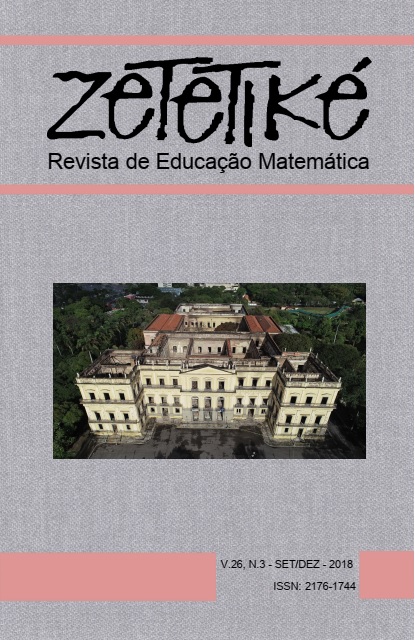Abstract
This paper aims to introduce a pattern to enable the identification of different levels of development of algebraic
thinking in students while solving sharing problems. Our research was conducted in two stages: during the first
one, we built up an initial version of the pattern based on 342 sixth-graders (around 11 years old) through an
analysis of their written answers to six sharing problems; in the second stage, we presented the same problems
to 343 sixth to ninth-graders (11 to 14 years old) in the city of Recife. Next, we selected 8 students, who we
interviewed for deeper explanations on their thinking. The analysis presented in this paper stems from the 8
students’ interviews answers and written production. Finally, we developed a proposal for a pattern of different
levels of algebraic thinking. The first one indicates the absence of algebraic thinking (Level 0). The second level
is an incipient level of algebraic thinking (Level 1). The third level means an intermediate level of algebraic
thinking (Level 2), while the last one shows that algebraic thinking has been consolidated (Level 3). In addition,
we propose three sublevels for each level, starting from Level 1, which we have named sublevels A, B and C.
References
Almeida, J. R. & Câmara, M. (2014). Análise dos problemas propostos para o ensino de equações polinomiais do 1º grau nos livros didáticos de matemática. Boletim GEPEM, 64, 3-17.
Almeida, J. R. & Câmara, M. (2017). Pensamento algébrico: em busca de uma definição. Revista Paranaense de educação Matemática, 6(10), 34-60.
Araújo, E. A. (2008). Ensino de álgebra e formação de professores. Educação Matemática Pesquisa, 10(2), 331 – 346. São Paulo.
Arcavi, A. (2005). El desarrollo y el uso del sentido de los símbolos. Conferência plenária no encontro de investigação em educação matemática. Caminha, Portugal. Retirado em 23/07/2014, de: http://www.educ.fc.ul.pt/docentes/jponte/DA/DAbibliografia.htm.
Borralho, A. & Barbosa, E. (2011) Padrões e o desenvolvimento do pensamento algébrico. Anais da XIII Conferência Iteramericana de Educação Matemática. (pp. 1-12) Recife: SBEM.
Fiorentini, D., Fernandes, F. L. P. & Cristovão, E. M. (2005). Um estudo das potencialidades pedagógicas das investigações matemáticas no desenvolvimento do pensamento algébrico. Seminário Luso-Brasileiro de Investigações Matemáticas no Currículo e na Formação de Professores. Lisboa. Retirado em 02/11/2010, de: http://www.educ.fc.pt/docentes/jponte/temporario/SEM-LB/Fiorentini-Fernandes-Cristovao2.doc.
Godino, J. D., Aké, L. P., Gonzato, M. & Wilhelmi, M. R. (2014). Niveles de algebrización de la actividad matemática escolar: implicaciones para la formación de maestros. Enseñanza de las Ciencias, 32(1), 199-219. Espanha. Disponível: http://www.raco.cat/index.php/Ensenanza/issue/view/21903/showToc
Kaput, J. (1999). Teaching and learning a new algebra with understanding. In E. Fennema, & T. Romberg (Eds.), Mathematics classrooms that promote understanding. (pp. 1-34) Mahwah, NJ: Lawrence Erlbaum.
Kaput, J. (2008). What is algebra? What is algebraic reasoning? In J. Kaput, D. Carraher, & M. Blanton (Eds.), Algebra in the Early Grades. (pp. 5-17) Lawrence Erlbaum Associates: New York.
Lins, R. C. (1992). A framework for understanding what algebraic thinking is. Tese de Doctor of Philosophy. School of Education, University of Nothingam: Nothingam, UK.
Lins, R. C. (1994a). Campos semânticos y el problema del significado em álgebra. UNO – Didáctica de las Matemáticas. 1, 1-7. Barcelona.
Lins, R. C. (1994b). O modelo teórico dos campos semânticos: uma análise epistemológica da álgebra e do pensamento algébrico. Dynamis. 1(7), 29-39. Blumenau.
Lins, R. C. & Gimenez, J. (2005). Perspectivas em Aritmética e Álgebra para o século XXI. Papirus: Campinas.
Marchand, P. & Bednarz, N. (1999). L’enseignement de l’algèbre au secondaire: une analyse des problèmes présentés aux élèves. Bulletin AMQ, 39(4), 30-49. Québec.
Oliveira, I. & Câmara, M. (2011). Problemas de estrutura algébrica: uma análise comparativa entre as estratégias utilizadas no Brasil e no Québec. Anais da XIII Conferência Iteramericana de Educação Matemática. Recife: SBEM.
Ponte, J. P. & Velez, I. (2011) Representações em tarefas algébricas no 2º ano de escolaridade. Boletim GEPEM. 59, 53-68.
Radford, L. (2006). Algebraic thinking and the generalization of patterns: a semiotic perspective. North America Conference of the International Group of Psychology of Mathematics Education – PME. 1, 1-21. México.
Radford, L. (2009). Signs, gestures, meanings: Algebraic thinking from a cultural semiotic perspective. Anais do Sixth Congress of the European Society for Research in Mathematics Education. Lyon, França, Disponível em:
Radford, L. (2011) Grade 2 students’ non-symbolic algebraic thinking. In J. Cai & E. Knuth, (Eds). A global dialogue from multiple perspectives. (pp. 303-322), Editora Springer. Berlin.
Ruiz, N., Bosch, M. & Gascón, J. (2010) La algebrización de los programas de cálculo aritmético y la introducción del álgebra en secundaria. In M. Moreno, A. Estrada, J. Carrillo & T. Sierra (Eds.), Investigación en Educación Matemática. (pp. 545-556). Lleida: SEIEM.
Santos Junior, C. P. (2013) Estratégias utilizadas por alunos do 7º, 8º e 9º ano do ensino fundamental na resolução de problemas de partilha. Dissertação de mestrado em Educação Matemática e Tecnológica. Recife: UFPE.
Silva, D. P. & Savioli, A. M. P. D. (2012). Caracterizações do pensamento algébrico em tarefas realizadas por estudantes do Ensino Fundamental I. Revista Eletrônica de Educação. 6(1). 206-222.
Vermersch, P. (1994). L’entretien d’explicitation en formation initiale et en formation continuale. ESF: Paris.

This work is licensed under a Creative Commons Attribution-NonCommercial-NoDerivatives 4.0 International License.
Copyright (c) 2018 Zetetike


